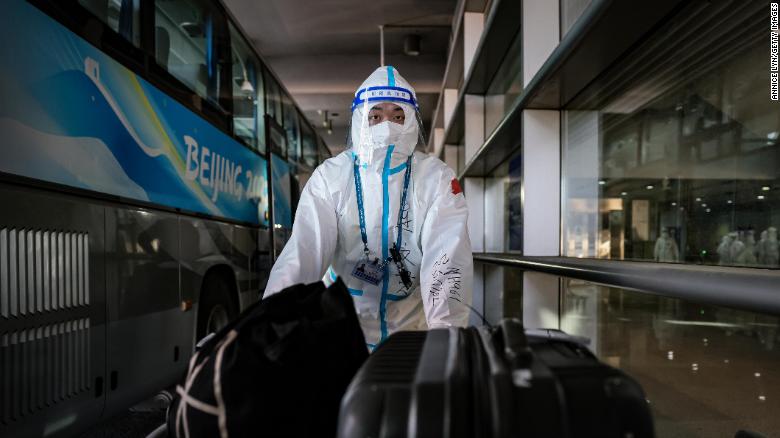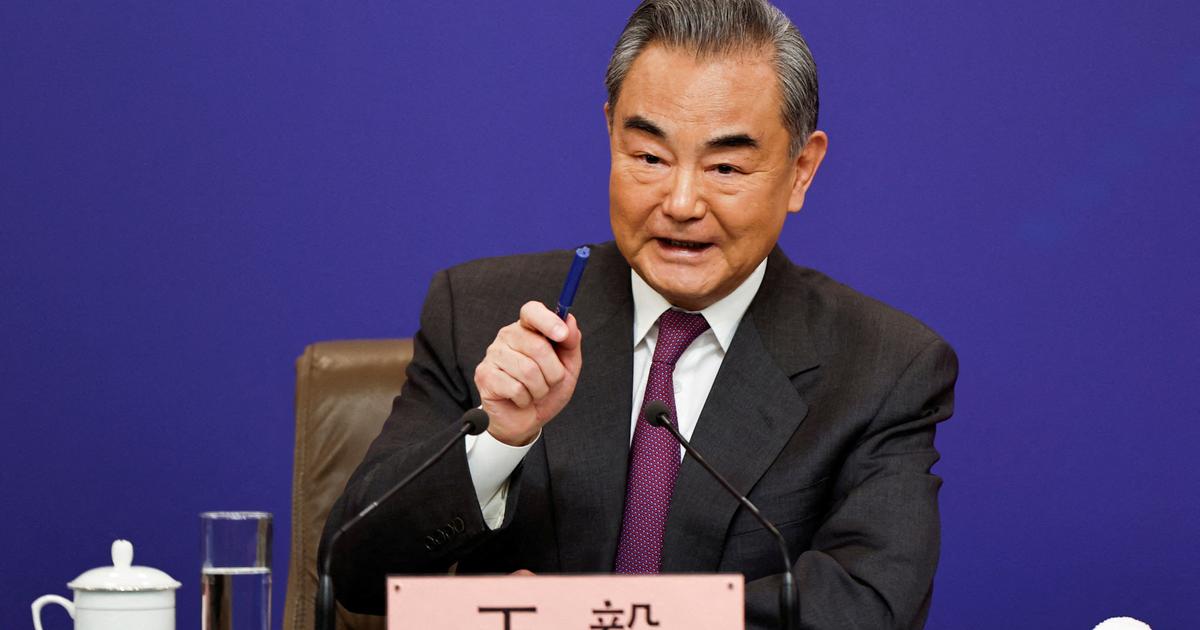This is the protocol to serve cocktails that they prepare in Beijing 0:40
(CNN) --
A slew of athletes from Western countries have been shocked by the strict Covid-19 restrictions they have encountered upon arrival in Beijing for the Winter Olympics in recent weeks.
Some were placed in isolation for weeks after a positive test, while others complained about the blandness of their food during quarantine.
The measures were a violation of their human rights, according to a Finnish coach.
But for 1.4 billion people in China, the conditions inside the Olympic bubble are a microcosm of the nation during the pandemic.
Beijing 2022 Winter Olympics: news, results, medals and more
China is one of the few places in the world still following a zero covid-19 approach in which slam shutdowns, mass testing, contact tracing and border entry restrictions are deployed to wipe out any trace of the virus. illness.
New strains of the coronavirus and frequent outbreaks have raised questions about how sustainable this strategy really is.
But with thousands of athletes and support staff arriving from around the world, many from countries that still have high numbers of cases after deciding to "live with covid," Beijing is not taking it lightly.
The contrast could not be more evident.
Athletes from places like the United States, where the effectiveness of masks are still debated, now face daily Covid-19 tests inside the "closed circuit" that separates Olympic participants from the rest of the capital.
Some of the measures are mere inconveniences.
For example, athletes must wear plastic gloves while their food is served in the cafeteria.
When a CNN reporter ordered meat at a hotel, she was told it could only be served well done, so cooked it looked like beef jerky, as a precaution against Covid-19.
advertising
But other measures have had greater repercussions.
More than 160 athletes or team officials have been isolated after testing positive for Covid-19.
Several athletes have missed out on the opportunity to compete, a devastating blow to those who have spent years training for this moment.
They cannot return to the Olympic bubble until all symptoms are gone and they have two consecutive negative tests.
An Olympic worker loads suitcases onto a media shuttle bus at the Beijing airport on February 2, ahead of the Winter Olympics.
"My heart and mind can't take this anymore," tweeted Polish short track speed skater Natalia Maliszewska, who was placed in isolation and missed her first competitive event.
China's authorities and state media have insisted these measures are necessary to prevent the spread of the virus, reflecting its zero-Covid-19 approach whereby even a handful of cases is considered an extreme national threat.
And state media have stepped up their defense, with a number of recent articles quoting athletes praising the bubble's "delicious food, warm volunteers, strict anti-epidemic measures, (and) perfect snow facilities."
The Olympians "received attention and were satisfied on the closed circuit," the state-run Global Times tabloid said on Tuesday.
Beijing 2022 Olympic Games: this is how it is to work inside the Olympic bubble
The cost of the zero covid-19 approach
China's zero-Covid-19 approach has kept case numbers and hospitalizations low for much of the pandemic following the original outbreak in early 2020.
Then the delta and omicron variants arrived last year, plunging China into a series of back-to-back waves that haven't stopped since.
Every time an outbreak was contained, another broke out weeks later.
Both variants are more transmissible than the previous ones, which means that the virus spread faster and took longer to control, requiring enormous amounts of resources, manpower and bureaucracy.
The pressure to stop these outbreaks intensified as China prepared to celebrate the Lunar New Year and the Games, a great moment of national pride as Beijing is the first city to host both the Summer Olympics and the Games. of winter.
It is also the first time in two years that China has relaxed its border controls, allowing an influx of foreign visitors to enter.
Faced with so much risk, local officials resorted to even stricter measures.
An outbreak in the northwestern city of Xi'an led to a complete lockdown, with all residents confined to their homes for an entire month, posing a huge logistical challenge for authorities, who had to deliver daily necessities to people's doorsteps. 13 million people.
ANALYSIS |
Outrage over Xi'an lockdown tests limits of China's zero covid-19 policy
There were also targeted lockdowns and restrictions in the cities of Beijing, Anyang, Tianjin and Shenzhen, after they reported Covid-19 cases, many of them caused by the omicron variant.
On Monday, the southwestern city of Baise joined the list, with 3.5 million residents banned from leaving their homes after reporting 56 cases in 24 hours.
During these closures, tens of millions of people, like those in the Olympic bubble, faced prolonged isolation and disruption to their daily lives.
Fear of food shortages often led to panic buying.
A local outbreak can mean multiple rounds of mass testing for all residents.
People lamented not being able to travel during the Lunar New Year, an important time for families to get together, similar to Thanksgiving or Christmas.
In Beijing and Shanghai, some reported being stuck in office buildings or shopping malls for days because someone inside had tested positive for Covid, forcing an immediate lockdown that only ended when everyone tested negative.
And, as athletes have pointed out, these restrictions can also have a much greater effect on people's well-being and mental health.
Many Xi'an residents, including vulnerable groups such as the elderly, flooded social media claiming they had not received enough food, basic supplies and even medical care, a sign of official dysfunction as the city struggled to adjust to its own restrictions.
Anger erupted online after a visibly pregnant woman was allegedly turned away from hospital for not having a valid covid-19 test, only to miscarry hours later.
Video shows thousands of residents being moved into isolation 0:52
Widespread support
With mounting challenges and the threat of future variants, it is unclear how long China's zero covid policy will be able to continue.
The government is already changing tack, referring instead to a so-called "dynamic cleaning" policy, which focuses on rapidly containing local outbreaks rather than keeping cases to zero across the country.
However, the general zero covid-19 attitude remains very popular with the Chinese public, in part due to the fact that only a small fraction of China's huge population is affected at any given time, which is considered a necessary sacrifice for the security of the country.
Latest news about covid-19 and the omicron variant in the world
The official death toll in China, less than 5,000, is markedly lower than that of other countries, such as the United States, which has registered more than 905,000 deaths from covid-19, according to a tally by Johns Hopkins University.
China's government has viewed its ability to keep Covid-19 largely under control for much of the pandemic, even as the virus raged abroad, as a political victory.
Many in China view the situation in the United States with horror;
As bodies piled up in New York during its Covid-19 peak, left in refrigerated trucks on the street and buried in mass graves, people in China went about their daily lives, feeling safe within the country's closed borders.
Dr. Anthony Fauci's warning in January that the omicron variant "will make almost everyone sick" represents the worst nightmare of many in China, and one that experts are determined to avoid at all costs, despite mounting uncertainty. on the long-term sustainability of the zero covid policy and the resource burden it requires.
The chaos in Xi'an demonstrated how difficult it is to apply this strategy in a large city, let alone multiple cities if an outbreak spreads on a larger scale.
"We used to think that COVID-19 could be basically contained by vaccines, but now it seems that there is no easy method to control it except through comprehensive measures," Wu Zunyou, chief epidemiologist with China's Center for Disease Control and Prevention, told Global. Times.
With no way to prevent imported variants from causing outbreaks, China has no plans to adjust its Covid-19 strategy for now, it added.
In less than two weeks, the last foreign athletes in the Olympic bubble will pack up and head home, leaving behind the daily reality of zero covid-19, while those in Beijing and across the country prepare for the long term, waiting for an end that is not in sight.
Covid-19Beijing Olympic Games 2022















